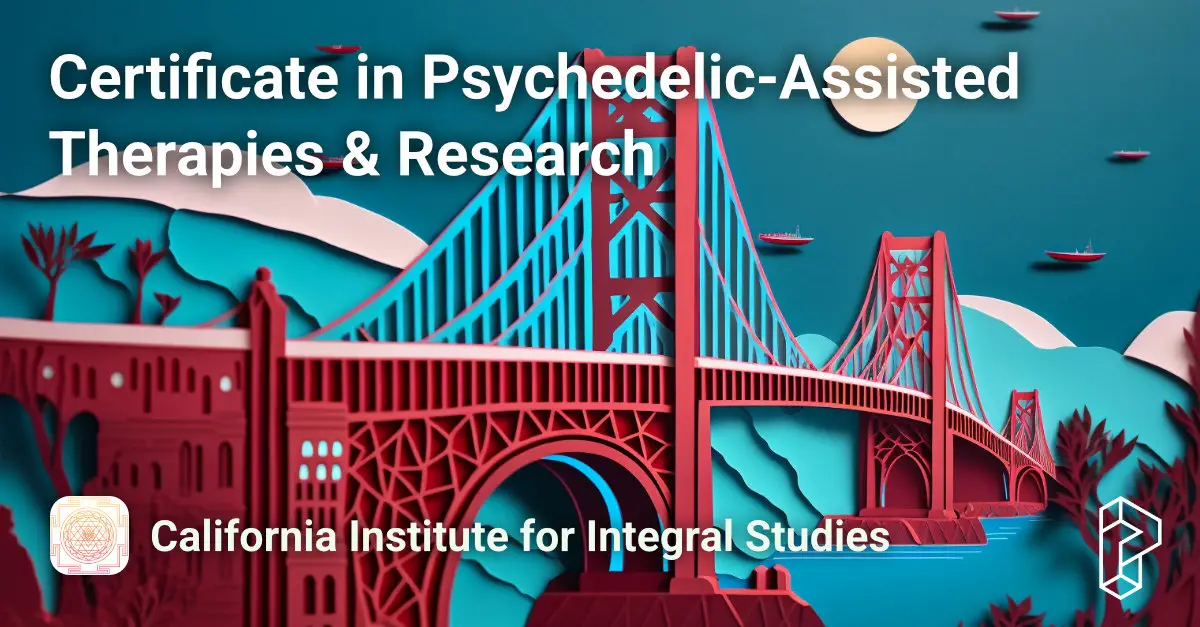Certificate in Psychedelic-Assisted Therapies and Research
The Psychedelic-Assisted Therapies and Research Certificate Program at the California Institute for Integral Studies (CIIS) Center for Psychedelic Therapies and Research (CPTR) is designed to meet the growing need for the training of skilled therapists and researchers in the field of psychedelic-assisted and entactogen-assisted psychotherapy research and clinical work.
- 700 Enrolled
- Professional
- Last updated May '25
- English
Course Description
The Psychedelic-Assisted Therapies and Research Certificate Program at the California Institute for Integral Studies (CIIS) Center for Psychedelic Therapies and Research (CPTR) is designed to meet the growing need for the training of skilled therapists and researchers in the field of psychedelic-assisted and entactogen-assisted psychotherapy research and clinical work. The program is open to professionals in licensed mental health, medical and legal professions, and ordained or commissioned clergy and chaplains.
The program is led by Dr. Janis Phelps, Director of the Center for Psychedelic Therapies and Research, and is taught by a multidisciplinary team of international expert teachers. The curriculum is designed to encompass all aspects of learning: intellectual/didactic, personal/experiential, and applied. Trainees will learn a wide variety of necessary skills and knowledge bases, ranging from the pharmacology of psychedelics to research design to psychedelic therapist competencies to the history of use of psychoactive plants across the globe to cultural competencies for working with diverse clients. The program thoroughly covers clinical work with MDMA and psilocybin (the two medicines furthest along in the FDA drug development process) with additional coursework on ketamine-assisted psychotherapy (FDA-approved for specific clinical syndromes).
The program values and implements the deconstruction of various perspectives and cultural viewpoints, along with didactic and experiential learning with teachers representing diverse specializations. The global wisdom traditions related to alterations of consciousness (meditation, yoga, fasting, solo wilderness retreats, healing methods, etc.) play a role in the theoretical underpinnings of the curriculum, as well as being directly enacted as part of the personal/experiential aspect of the training. Two core elements for the classes are diversity, inclusion, and belonging as well as navigating the challenges of non-traditional therapies.
This course is accepted for the Oregon Facilitator program. Applications open February 15th, 2023.
What you’ll learn
- Develop advanced level of expertise in creating therapeutic relationships, embodying therapeutic presence and understanding psychedelic research protocols and integration practices.
- Increase skills in cultural humility for working with diverse clinical populations.
- Access influential network of graduates, mentors, teachers and stakeholders.
- Specialize in knowledge of best therapeutic and research practices with classic psychedelics and MDMA.
- Gain foundational knowledge in classes on ketamine and plant medicines.
- Enjoy support and conviviality of a cohort of licensed mental health and medical professionals.
- Join program alumni in specialized online community platform with forums, events, resources and job postings.
- Access extensive references and resources to expand skill base.
- Learn to enhance personal journey of transformation, well-being and connections with inner healing capacities.
- Join an engaged, inclusive and healing classroom atmosphere that nurtures human capacity for aliveness and community connection.
- Expand scope of practice within profession to include skills and insights from certificate training.

Tatayo
Instructor
About Instructor
Tatayo (“Fruit of the Wind”) first arrived in Gabon in 1971 at the age of 21 and became a Gabonese citizen. In 1979, he became the first white person to be initiated into the Bwiti Fang tradition in Gabon. In 1994, he was initiated into the Misokko tradition. As a guide for numerous expeditions and missions, including those of National Geographic, the BBC, and others, Tatayo is considered to have “opened the door” to westerners in Gabon.
Frequently Asked Questions
$8300
This course includes
- Modules 10
- Duration 10 Months
- Skills Professional
- Language English
- Availability Cohort
- Certificate CE
Transform Your Life with FLO CoachingAD
Ready to break through personal barriers and discover a deeper sense of fulfillment? FLO Coaching offers one-on-one psychedelic truffle journeys in the Netherlands, guided by experienced professionals. Our carefully crafted experiences combine the power of psychedelics with personalized coaching, helping you gain profound insights and create lasting positive changes.
Elevate your personal development to new heights in a safe, legal, and supportive environment. From preparation to integration, we're there every step of your transformative journey.
Take the first step towards a more resilient, meaningful life. Schedule a free call with FLO Coaching today and unlock your full potential.
